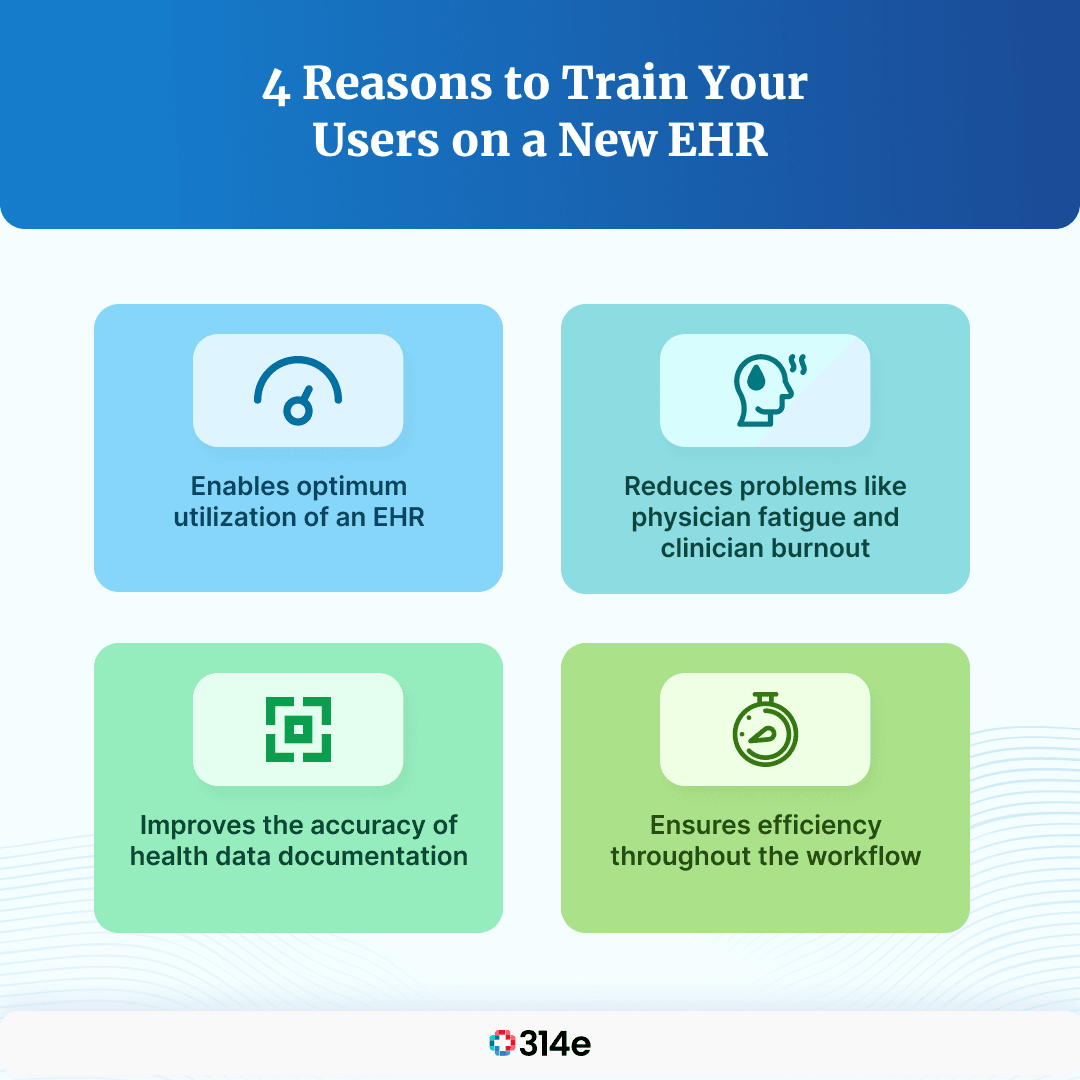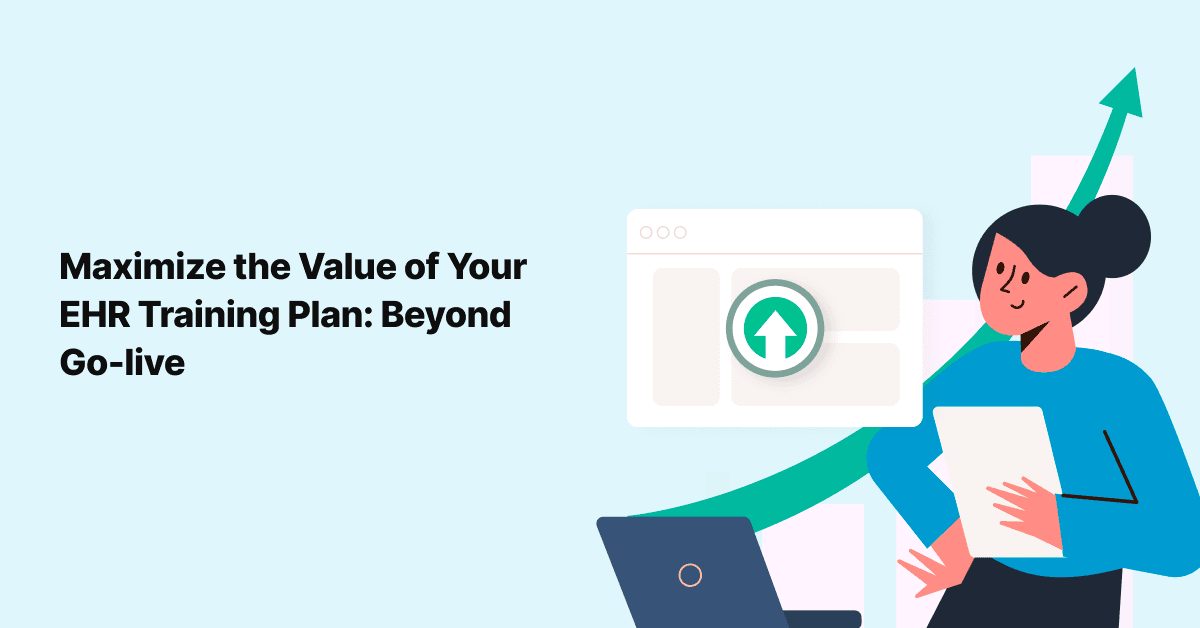
Training in a Covid World
Despite recent challenges in the world of training and EMR implementation, training still remains just as …

The shift from paper medical records to the electronic version of storing patient health data hasn’t been as easy as it was promised to be. One of the major causes is the lack of appropriate training to adopt healthcare software that replaces manual methods. Using an Electronic Health Record (EHR) to digitalize patient care can be instrumental for it brings benefits like the ability to save time, the capacity to provide better access and control over sensitive patient data, and so on. While this is true, it is also crucial to remember that when an adequate amount of training isn’t provided to use software like an EHR, the chances of it becoming a burden rather than a boon are quite high.
In this article, you will discover:
In order to adopt a new EHR, your providers need to be trained in many and often complicated workflows that come as a part of it. When appropriate training isn’t provided, there is every chance that the EHR user may find it challenging to use the software to its full potential. It may also lead to your EHR user, like a physician, getting frustrated as too much time is taken up by a simple task in the workflow due to the lack of adequate training. Of all the challenges connected with adopting a new EHR, this could be the most difficult one to deal with as it impacts the long-term effectiveness of the EHR.
In some cases, it might happen that the chosen EHR is not suitable or easily adaptable to the existing workflow in your health system and practices in your network. This can be extremely challenging, and when it comes to adapting and training your staff to use, it could almost be considered impossible. While this is something that needs to be considered before implementation, it is also something that could cause trouble for the health system. One other difficulty with switching to a new EHR is the increased complexity of interoperability. Since EHRs are customized to specific needs, some data sharing can become difficult.
Accepting change isn't easy for most people. Especially when it comes to a new EHR, something that plays a crucial part in their everyday life. They are reluctant to accept change. Helping your users understand how the new technology can make things easier for them is undoubtedly a taxing task, mainly because they are ignorant of the benefits of the new technology.
When it comes to the task of moving data to a new EHR, data privacy concerns may shoot up to a great extent. The chances of security breaches and cyber-attacks are key problems that could worry your stakeholders. Things could get worse when there is no clear-cut plan for data migration.
When it comes to a new EHR, buy-in across the entire organization is absolutely essential. It is crucial to have your clinicians accept and adopt your new EHR to help the healthcare organization decide on how the EHR will be used in the short and long run. They certainly need a voice in the development of the workflows since they are impacted the most when switching to a new EHR.

When the right training is provided for new EHR adoption, it could help your users and the healthcare organization in the following ways:
The right EHR could make a difference to your health system in more ways than you can imagine. Adequate training can empower your users to discover all the capabilities of an EHR and use it to its optimum potential, thereby bringing back greater returns on the capital investment. An EHR must simply not be looked at as just a medium to store patient health data. An EHR is capable of so much more. It could help with sending appointment reminders, billing, scheduling, and also managing claims, and, most importantly, helping you better meet the reporting requirements. To discover everything that an EHR is capable of, it becomes extremely important to provide your users with appropriate training and ongoing training.
One major concern with switching to a new EHR is that your users tend to lose a lot of energy figuring out the use cases. This initially leads to clinician fatigue and, in severe conditions, leads to burnout. It also results in patient care being compromised. When the right training is provided to your end-users, they can find a solution to the issues arising in the workflow without having to struggle. Effective training can reduce frustration and ineffective workflows that lead to fatigue and burnout.
Training can also help with improving user efficiency while reducing the chance of errors. This is made possible by ensuring enhanced communication and providing solutions to beat the day-to-day challenges faced while adopting a new EHR. Since training ensures lesser preventable errors and a reduction in the need to rework, it can lead to improved patient care.
Training ensures the provision of centralized resources that are easy to assimilate. Such resources also boost the morale of the users and restore their confidence in dealing with the EHR. This improves the quality of work in each step of the workflow and thereby ensures overall effectiveness.
When it comes to providing training to use a new EHR, it always begins with evaluating the technical abilities of your existing users. The new EHR is ultimately going to be used by them; hence, it is important to run a check on their readiness for adoption and use. Your employees can be tested on several levels to understand their ability to respond to new technology.
The next step after identifying your users’ technical abilities is to pick out a few super users. Super users refer to people in your organization who would be trained extensively so that they can act as a resource who can provide other users with answers to every question that arises within an EHR.
An EHR usually comes with endless features; while the use of all features is important, it isn’t necessary for every user to be trained on every single feature. An effective step would be to provide extremely specific training to users based on what their role in the organization requires. Your users would usually have a set workflow and mostly repeat the same tasks each day; hence, in-depth training in a specific area would keep the training simple and still effective over time. With such specialization in training, you could also bring about some kind of customization to make it all the more appealing.
The task of providing appropriate training is only half the job; the other important part involves collecting feedback from your EHR users on how impactful the training is. Understanding what kind of difference the training is making is certainly what can help identify the areas that need improvement and make training more impactful. You may also go ahead and conduct surveys to measure the effectiveness of training.
A great way to supplement your training resources and efforts would be to make the best use of the educational materials from your EHR vendor. EHR vendors generally provide a manual that can take your users through the new EHR with the help of step-by-step instructions. This can help you save costs and help with easy EHR adoption.
These were some things to be taken into consideration for EHR implementation training. When training is left to us, our experienced team at 314e provides the absolute best quality in training, as it is an integral part of a successful implementation. We take the help of Subject Matter Experts (SMEs) to screen and hire “best-of-the-best” trainers to ensure the highest quality and best fit for your implementation needs. We offer training solutions from start to finish of implementations and solutions that support continuous training needs for new hires, upgrades, and optimizations. To put it in even simpler words, we help you get Training & Go-live Support for the entire employee lifecycle.
Join over 3,200 subscribers and keep up-to-date with the latest innovations & best practices in Healthcare IT.

Despite recent challenges in the world of training and EMR implementation, training still remains just as …

Electronic Health Records (EHRs) have ushered in a new era of healthcare, transforming patient care, data …

Health systems are finding creative and innovative ways to keep physicians, clinical and administrative staff …